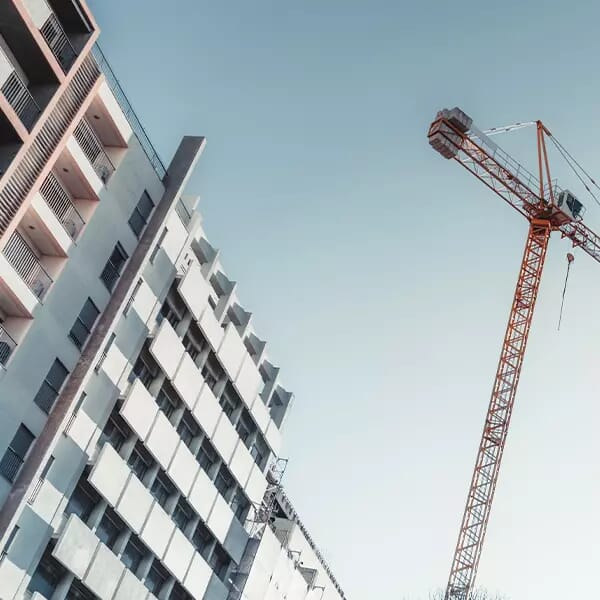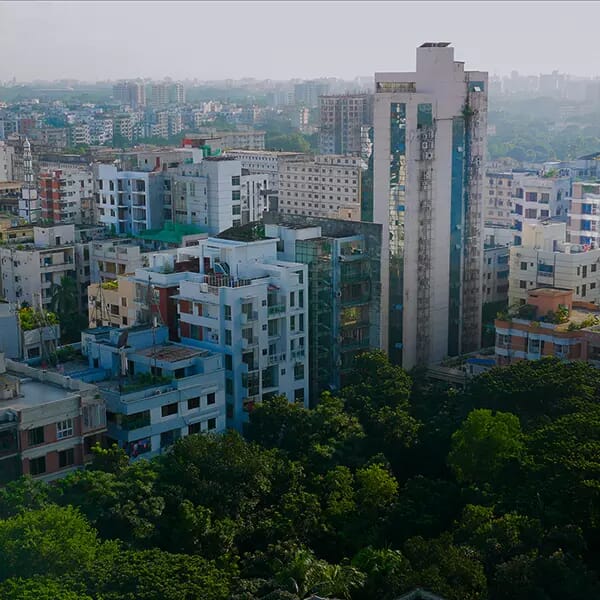 Credit: Envato Elements
Credit: Envato ElementsIndia’s Real Estate Sector Analyzes COVID-19 Impact
April 7, 2020Real Estate
Markets do not like uncertainty, even worse, not knowing time frames of how long events will last. As global markets begin to fall, will India’s real estate sector and its economy sink or swim through this so-called, black swan event?
GRI Club India Real Estate members discussed during last week's eMeeting the impact Coronavirus (COVID-19) will have on the economy in the next months. Members agreed that recession is settling in and we have yet to understand the magnitude of the impact it will have on India. Specialists believe that this recession will be worse than the one experienced in 2008-2009.
Indian Economy to be Hit by COVID-19
In the 2008-2009 recession, there were clear warning signs that foreshadowed its arrival. However, this time around, in a time span of 17 to 18 days, the economic and sentimental parameters have had a deep impact on the stock markets. There are various possible scenarios. The first is the base case scenario where the markets improve by the end of the 3Q20. Secondly, the worst-case scenario where the markets will pick up in 2Q21. If the current situation is stabilised by April 30, then the populations’ consumption needs will come back with a vengeance and the market might tag this pandemic as just a bad memory. However, if the situation takes longer to stabilize then this would result in drastic change in consumption and behavior patterns.
Members feel quarterly returns can be summarized as the following:
To have a better understanding of the route the economy could take, it makes sense to see how the chinese economy has picked up. Using China as an example, first-quarter 2020 GDP growth is expected to drop by about eight to 10 percent. Second-quarter 2020 GDP growth is expected to slightly recover but would still be flat or only marginally positive during the second quarter. We don’t expect China’s economy to fully recover until 3Q 2020. It’s full-year 2020 GDP growth is probably going to be around 3%.
However, members believe that developed markets will recover faster than the Indian markets. India will witness a slowdown in the current and coming quarter, however, it stands to benefit post recovery. Once things normalize, the production activities will need to be fast-tracked to relieve the stagnation in the next quarters.
According to Members, during this period we will see an increase in Zombie Companies, which are those that do not generate cash flows. At the moment 18 percent of the companies are Zombie companies, which could also lead to an increase in lease renegotiations with sale and lease back options. From the tenant side, massive consolidation is expected as a consequence of the pandemic.
A cloud of uncertainty is hovering over the market and the next two to three weeks will be critical, not only to understand how it will impact the market, but also in market sentiment. There is a silver lining, among the clouds, and members believe the real estate market will eventually self-correct in the period following the pandemic in 2021.
Dealflow and New Investments on Hold Until 2H20
The pandemic has caused delays in many projects and schedules, therefore many financial institutions will also see a delay in payment collection for their loan portfolios. Members see that 2H20 will generate higher tension, nevertheless commercial and warehousing portfolios will not be the stress’ root cause as financial costs are included in construction phases. Once assets are in their operational phases, there is a 3-6 point delay already integrated into the interest rates.
When it comes to deal flow in the Indian real estate sector, members believe that it will be a “pens down” scenario for any deals that were to be signed and will now be pushed to the 2H20. Any expansion decisions that were being deliberated are also being put on hold.
COVID-19 Impact is Felt in Indian Real Estate
Residential Sector will Take Time to Recover
Overall, the common perception among members was that residential assets would require more time to get back on track and achieve the required sales velocity. Although 1H20 is expected to report losses, members hope that 2H20 should make up for at least one quarter of the first half. In the short term, recovery will be tedious and could heighten the already negative sentiments toward asset classes. Throughout the discussion, there was larger concern regarding the residential sector as the purchasing of residential properties will be delayed and the proceeds of the sales that are made will be reinvested into construction costsThe liquidity crunch in the sector which has already been in a difficult state for some time now is just going to get compounded as an effect to the pandemic.
Office Sector: Contract Renegotiations and Lockdown Gives Light to Co-Working Trend
When it comes to the office sector transactions, most use long-term contracts with an escalation clause that shields commercial assets from COVID-19’s impact. Nevertheless, members share that there could be scenarios where the tenants request to renegotiate, which some accept to maintain the business relationship.
The enforced lockdowns will leave many properties unoccupied for some time, increasing the chances of force majeure events, and tenants will be unable to cash out rent fees. Ultimately, this will lead to a decrease in yield to investors.
With this experience, members expect a decline in office assets in the 1H20, however, these spaces are likely to remain an active market, especially since India is an outsourcing hub) and should not raise many red flags.
Co-working spaces have continued as the people continued going to their offices only a week ago. Members voiced that there is negative press regarding hygiene and safety in co-working spaces, which is only a myth. After the lockdown, many believe that there will be a rise in flexible working culture, with it increasing the demand for more co-working spaces.
Many corporates have only implemented work from home policies due to the lockdown measures that forced them to send employees home. If this lasts for a while, there is a large possibility that many businesses will evolve and adapt to the remote office model.
Large corporates that are injecting funds to purchase large office spaces have realized that technology is now making it easier to explore remote working options and better manage employee to seat ratios, along with rental costs. Members believe that this experience will change the way we do business though India’s work culture would make it more difficult for it to embrace home office.
IT Parks and Logistics to Overcome the Hurdle
In India, IT Parks house two types of business models: third-party service providers and captive businesses. For the most part, third-party service providers are exposed to higher risks and can be seen for example in the decreasing share price of companies such as TCS and Infosys. These types of businesses are expected to see a cut in revenue growth of 2-3 percent. Captive businesses will be impacted - may suffer some impact which will defer from sector to sector. However, India has less price sensitivities as compared to the west which should hedge the risks likely to impact the business.
Members agreed that IT parks are not immune to the expected slowdown but given its global connection that the business is critical globally and the IT sector is accustomed to work from home practices, this asset class is reasonably shielded from the impact.
The logistics sector is one of the few that can take a more aggressive stance, as well as evaluate more acquisition opportunities, according to members. However, members have focused on managing the impact of the pandemic on their current asset portfolios and explore new opportunities in the next three to four months. They feel that the logistics sector is currently in a growth phase and that the current scenario will just be a bump in the road.
This information was discussed during our last GRI eMeeting with our India Real Estate members. Join the discussion and register for the next eMeeting here: https://www.griclub.org/emeetings.html
GRI Club India Real Estate members discussed during last week's eMeeting the impact Coronavirus (COVID-19) will have on the economy in the next months. Members agreed that recession is settling in and we have yet to understand the magnitude of the impact it will have on India. Specialists believe that this recession will be worse than the one experienced in 2008-2009.
Indian Economy to be Hit by COVID-19
In the 2008-2009 recession, there were clear warning signs that foreshadowed its arrival. However, this time around, in a time span of 17 to 18 days, the economic and sentimental parameters have had a deep impact on the stock markets. There are various possible scenarios. The first is the base case scenario where the markets improve by the end of the 3Q20. Secondly, the worst-case scenario where the markets will pick up in 2Q21. If the current situation is stabilised by April 30, then the populations’ consumption needs will come back with a vengeance and the market might tag this pandemic as just a bad memory. However, if the situation takes longer to stabilize then this would result in drastic change in consumption and behavior patterns.
Members feel quarterly returns can be summarized as the following:
- 1Q20: Strong impact on the real estate industry and taking a wait and watch stance
- 2Q20: Both the sector and economy will look for ways to push forward
- 3Q20 - 4Q20: Businesses will start to analyze the aftermath and generate solutions
To have a better understanding of the route the economy could take, it makes sense to see how the chinese economy has picked up. Using China as an example, first-quarter 2020 GDP growth is expected to drop by about eight to 10 percent. Second-quarter 2020 GDP growth is expected to slightly recover but would still be flat or only marginally positive during the second quarter. We don’t expect China’s economy to fully recover until 3Q 2020. It’s full-year 2020 GDP growth is probably going to be around 3%.
However, members believe that developed markets will recover faster than the Indian markets. India will witness a slowdown in the current and coming quarter, however, it stands to benefit post recovery. Once things normalize, the production activities will need to be fast-tracked to relieve the stagnation in the next quarters.
According to Members, during this period we will see an increase in Zombie Companies, which are those that do not generate cash flows. At the moment 18 percent of the companies are Zombie companies, which could also lead to an increase in lease renegotiations with sale and lease back options. From the tenant side, massive consolidation is expected as a consequence of the pandemic.
A cloud of uncertainty is hovering over the market and the next two to three weeks will be critical, not only to understand how it will impact the market, but also in market sentiment. There is a silver lining, among the clouds, and members believe the real estate market will eventually self-correct in the period following the pandemic in 2021.
Dealflow and New Investments on Hold Until 2H20
The pandemic has caused delays in many projects and schedules, therefore many financial institutions will also see a delay in payment collection for their loan portfolios. Members see that 2H20 will generate higher tension, nevertheless commercial and warehousing portfolios will not be the stress’ root cause as financial costs are included in construction phases. Once assets are in their operational phases, there is a 3-6 point delay already integrated into the interest rates.
When it comes to deal flow in the Indian real estate sector, members believe that it will be a “pens down” scenario for any deals that were to be signed and will now be pushed to the 2H20. Any expansion decisions that were being deliberated are also being put on hold.
COVID-19 Impact is Felt in Indian Real Estate
Residential Sector will Take Time to Recover
Overall, the common perception among members was that residential assets would require more time to get back on track and achieve the required sales velocity. Although 1H20 is expected to report losses, members hope that 2H20 should make up for at least one quarter of the first half. In the short term, recovery will be tedious and could heighten the already negative sentiments toward asset classes. Throughout the discussion, there was larger concern regarding the residential sector as the purchasing of residential properties will be delayed and the proceeds of the sales that are made will be reinvested into construction costsThe liquidity crunch in the sector which has already been in a difficult state for some time now is just going to get compounded as an effect to the pandemic.
Office Sector: Contract Renegotiations and Lockdown Gives Light to Co-Working Trend
When it comes to the office sector transactions, most use long-term contracts with an escalation clause that shields commercial assets from COVID-19’s impact. Nevertheless, members share that there could be scenarios where the tenants request to renegotiate, which some accept to maintain the business relationship.
The enforced lockdowns will leave many properties unoccupied for some time, increasing the chances of force majeure events, and tenants will be unable to cash out rent fees. Ultimately, this will lead to a decrease in yield to investors.
With this experience, members expect a decline in office assets in the 1H20, however, these spaces are likely to remain an active market, especially since India is an outsourcing hub) and should not raise many red flags.
Co-working spaces have continued as the people continued going to their offices only a week ago. Members voiced that there is negative press regarding hygiene and safety in co-working spaces, which is only a myth. After the lockdown, many believe that there will be a rise in flexible working culture, with it increasing the demand for more co-working spaces.
Many corporates have only implemented work from home policies due to the lockdown measures that forced them to send employees home. If this lasts for a while, there is a large possibility that many businesses will evolve and adapt to the remote office model.
Large corporates that are injecting funds to purchase large office spaces have realized that technology is now making it easier to explore remote working options and better manage employee to seat ratios, along with rental costs. Members believe that this experience will change the way we do business though India’s work culture would make it more difficult for it to embrace home office.
IT Parks and Logistics to Overcome the Hurdle
In India, IT Parks house two types of business models: third-party service providers and captive businesses. For the most part, third-party service providers are exposed to higher risks and can be seen for example in the decreasing share price of companies such as TCS and Infosys. These types of businesses are expected to see a cut in revenue growth of 2-3 percent. Captive businesses will be impacted - may suffer some impact which will defer from sector to sector. However, India has less price sensitivities as compared to the west which should hedge the risks likely to impact the business.
Members agreed that IT parks are not immune to the expected slowdown but given its global connection that the business is critical globally and the IT sector is accustomed to work from home practices, this asset class is reasonably shielded from the impact.
The logistics sector is one of the few that can take a more aggressive stance, as well as evaluate more acquisition opportunities, according to members. However, members have focused on managing the impact of the pandemic on their current asset portfolios and explore new opportunities in the next three to four months. They feel that the logistics sector is currently in a growth phase and that the current scenario will just be a bump in the road.
This information was discussed during our last GRI eMeeting with our India Real Estate members. Join the discussion and register for the next eMeeting here: https://www.griclub.org/emeetings.html



